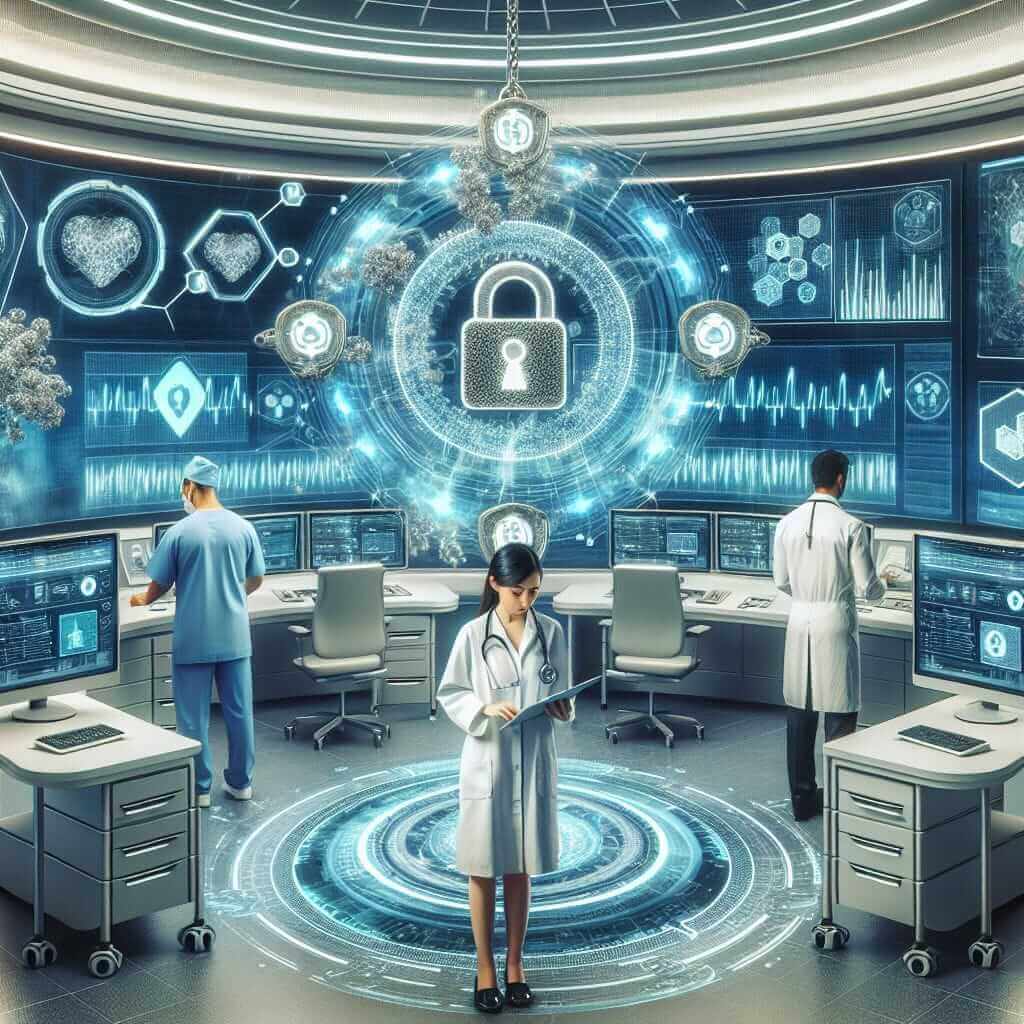The IELTS Reading test is a critical component of the full IELTS exam, designed to evaluate a candidate’s reading comprehension skills in various contexts. With a 60-minute time limit, the Reading section includes three passages of increasing complexity, each accompanied by a set of questions aimed at testing different aspects of understanding and interpretation.
The topic “How is blockchain technology influencing global healthcare access?” is not only relevant given the current advancements in technology but also has appeared in various forms in recent IELTS examinations. The increasing application of blockchain in healthcare, combined with its potential to address global disparities in medical access, suggests that similar themes might appear in future exams.
The Reading Passage and Questions
Passage: Blockchain Technology and Global Healthcare Access
Reading Level: Medium Text
Blockchain technology is transforming various sectors, with healthcare being one of the most promising areas. Its capacity to decentralize data, enhance security, and promote transparency is revolutionizing how healthcare systems operate worldwide. This transformation is particularly pivotal in ensuring equitable healthcare access across different regions.
In developing countries, healthcare systems often grapple with issues of data authenticity, accessibility, and resource allocation. Blockchain offers a decentralized system that can improve patient data management and deliver crucial medical resources more efficiently. For instance, through blockchain, medical histories can be securely shared among healthcare providers, ensuring continuity and coherence in patient care.
<
Additionally, blockchain can address the pressing issue of counterfeit drugs, which disproportionately affects low-income nations. By using a tamper-proof blockchain ledger, the supply chain of pharmaceuticals can be meticulously tracked, guaranteeing the authenticity and safety of the medication.
Moreover, blockchain facilitates international collaborations and data sharing, key to tackling global health crises like pandemics. By providing a secure platform for data exchange, researchers and medical professionals can work together more effectively, accelerating the development of treatments and vaccines.
However, the integration of blockchain in healthcare is not without challenges. Issues such as high implementation costs, technological literacy, and regulatory hurdles must be addressed. Despite these obstacles, the potential benefits of blockchain technology in creating a more accessible and efficient global healthcare system are undeniable.
Questions
Multiple Choice
-
What is one way blockchain technology aids healthcare systems in developing countries?
a) Increasing the cost of medical resources
b) Ensuring secure sharing of patient data
c) Limiting international collaborations
d) Reducing the number of healthcare professionals -
How does blockchain help against counterfeit drugs?
a) By increasing the number of drug manufacturers
b) By creating a centralized database for all medications
c) By using a tamper-proof ledger to track the supply chain
d) By reducing the cost of drugs
True/False/Not Given
- Blockchain technology cannot be used to share medical data internationally.
- High implementation costs are one of the challenges of integrating blockchain in healthcare.
- Blockchain guarantees that all healthcare data is completely secure and unhackable.
Matching Information
- Match the following features with how they are influenced by blockchain technology:
a) Patient data management –
b) Drug safety –
c) International research collaboration –
Sentence Completion
- Blockchain technology enhances healthcare systems by ____ patient data among healthcare providers.
- One of the critical issues blockchain addresses in low-income nations is the problem of ____ drugs.
Answers and Explanations
-
Answer: b) Ensuring secure sharing of patient data
Explanation: The passage highlights blockchain’s role in securely sharing patient data among healthcare providers to improve care continuity. -
Answer: c) By using a tamper-proof ledger to track the supply chain
Explanation: It is explicitly stated in the passage that blockchain’s tamper-proof ledger ensures the authenticity of medications through meticulous tracking. -
Answer: False
Explanation: The passage mentions that blockchain facilitates international collaborations and data sharing. -
Answer: True
Explanation: The passage lists high implementation costs as a challenge of blockchain integration in healthcare. -
Answer: Not Given
Explanation: While blockchain is noted for enhancing security, the passage does not make a claim that it guarantees complete security. -
Answers:
a) Patient data management – Blockchain allows secure and efficient sharing of patient data.
b) Drug safety – Blockchain tracks the pharmaceutical supply chain to prevent counterfeit drugs.
c) International research collaboration – Blockchain creates a secure platform for data exchange among researchers. -
Answer: securely sharing
Explanation: Blockchain technology is described as enhancing healthcare systems by securely sharing patient data. -
Answer: counterfeit
Explanation: The passage emphasizes that blockchain addresses the issue of counterfeit drugs in low-income nations.
Lessons Learned
When tackling IELTS Reading comprehension texts, students often struggle with:
- Recognizing paraphrased information.
- Distinguishing between similar yet distinct details.
- Managing their time effectively across questions.
Vocabulary
- Decentralize (/ˌdiːˈsentrəˌlaɪz/): To distribute the administrative powers or functions of (a central authority) over a less concentrated area.
- Tamper-proof (/ˈtæmpər pruːf/): Designed to make unauthorized access or changes difficult or impossible.
- Continuity (/ˌkɒntɪˈnjuːɪti/): The unbroken and consistent existence or operation of something over time.
- Regulatory hurdles (/ˈreɡjələtɔːri ˈhɜːrdlz/): Difficulties or obstacles posed by rules and regulations.
Grammar Point
- Relative Clauses: Used to give additional information about a noun without starting a new sentence. Example:
- “Blockchain offers a decentralized system that can improve patient data management.”
- Here, “that can improve patient data management” is a relative clause providing more information about “a decentralized system.”
- “Blockchain offers a decentralized system that can improve patient data management.”
Tips for High Reading Scores
- Practice Regularly: Consistent practice with various reading topics enhances comprehension skills.
- Improve Vocabulary: A strong vocabulary aids in better understanding and quicker context evaluation.
- Time Management: Practice under timed conditions to simulate the real exam environment.
- Skim and Scan: Learn to skim passages for main ideas and scan for specific details to answer questions efficiently.
- Understand Question Types: Familiarize yourself with different question formats like True/False/Not Given, Multiple Choice, and Matching Information, among others.
By incorporating these strategies, candidates can significantly enhance their performance in the IELTS Reading section.